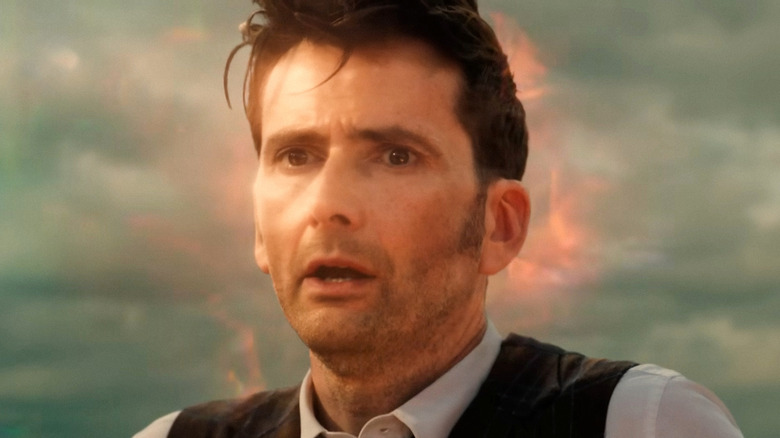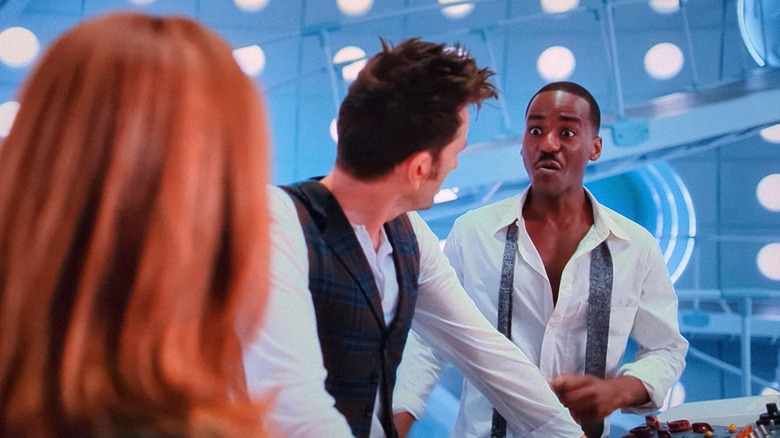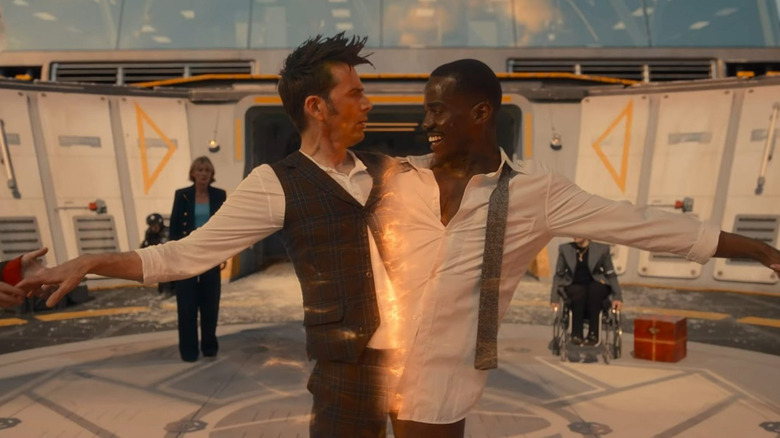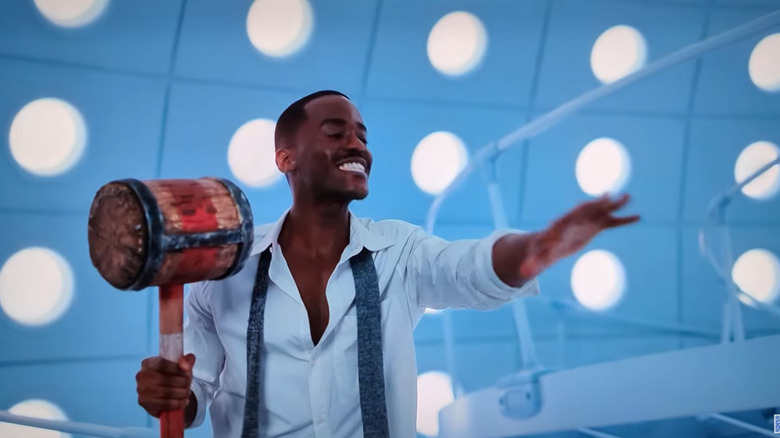Doctor Who Just Invented An Absurd New Type Of Time Lord Regeneration
This post contains spoilers for the "Doctor Who" 60th Anniversary Special "The Giggle."
When the news broke that Russell T. Davies would be returning to "Doctor Who" for the first time in more than a decade, there was a lot to be excited for and a lot be worried about. Davies had a great original run, arguably the best of the three modern showrunners, but his plot resolutions often left a bit to be desired. He had a tendency to throw all logic and continuity out the window for the sake of a happy ending, like in the "Doctor Who" season 4 finale where the Doctor managed to withhold his regeneration by basically transferring his regenerative energy into a severed hand of his, creating a clone of himself.
This all served the purpose of giving former companion Rose a happy ending. She got to live with the clone Doctor in her own alternate universe, whereas our Doctor got to continue going on his usual adventures. Many fans have argued that this ending is nowhere near as happy as it seems; this Doctor might act like he's happy to hang out with Rose for the rest of his life, but fans speculated he'd go insane after just a few years earthbound. Nevertheless, the episode itself tells us this is a happy ending, so it's easy to just imagine it is.
With the last of the three 60th Anniversary Specials, "The Giggle," history has repeated itself with yet another nonsense twist involving a David Tennant-Doctor's regeneration. This time, the Fourteenth Doctor doesn't stick around by cloning himself; he sticks around through a process called "bi-generation." Fourteen gets to stay in the climax of the episode while Fifteen (played by Ncuti Gatwa) simultaneously gets his first official introduction. The two Doctors work together to save the day, they talk for a bit, and then they go their separate ways.
Doesn't really make much sense, does it?
The episode establishes that, even though Fifteen and Fourteen didn't do any time traveling in their scene together, Fifteen is still in Fourteen's future. The Fourteenth Doctor will spend the rest of his life living a blissful, mostly-domestic existence with Donna's family, and when he's ready to go (and has finished healing from all the trauma he's faced for 1,000+ years), he'll regenerate into Fifteen, who we've just met.
How does this work, exactly? Considering we saw Fifteen be pulled out of Fourteen's regenerating body, how will Fourteen regenerate into him for real when the time comes? Or has the regeneration already happened, and Fourteen will simply die a normal death when his time comes? "The Giggle" itself seems remarkably uninterested in clarifying any of this, which only goes to show: the Russell T. Davies era is back, guys. It's so back.
Like the conclusion to Ten's sorta-regeneration in "Journey's End," the bi-generation plot point in "The Giggle" is one that clearly prioritizes fan service over consistent worldbuilding. It's a deus ex machina so bold and aggressive you have to admire it. People gave former showrunner Steven Moffat plenty of flak for his questionable endings over the years, like his decision to reveal that The Doctor never actually blew up Gallifrey after all in the 50th Anniversary Special, but he rarely pulled out a solution as flimsy as this. Even his many bootstrap paradoxes, which Moffat started to treat as a narrative get-out-of-jail-free card, at least kept a logical consistency to them that bi-generation simply doesn't have.
Why it kinda works anyway
The ending to "The Giggle" is a clear-cut example of the show trying to have its cake and eat it too. It wants to have Fourteen regenerate into Fifteen, as we all know it has to do, but it still wants to keep Fourteen around anyway. The result is a solution that feels like cheating, which is perhaps appropriate for an episode whose villain is all about playing games by the rules.
Yu have to admit it's delightful to see Gatwa and Tennant act alongside each other, and to get another rare glimpse of the Doctor talking to his former self. It's also undeniably heartwarming to see Fourteen — and Ten, by extension — finally get a happy ending after his somber departure in "The End of Time." The modern run of "Doctor Who" has piled an absurd amount of trauma onto this poor Time Lord, and it's struggled under the strain of keeping him fun and exciting even as he's constantly dealing with the heaviest grief imaginable.
It also helps that Davies has done a good job in the first two specials of establishing that the Doctor needs a break. He needs at least a few decades of relative peace and quiet, rather than constantly flying from place to place, throwing himself into one new chaotic situation after another. On an emotional level, viewers have well understood that Fourteen's ending is exactly what the Doctor needs; it's easy to get behind this conclusion, even if the road to it was nonsensical.
What this means for the show
There are a lot of immediate implications for "Doctor Who" that come to mind after "The Giggle." The first is that Gatwa's Doctor might be the happiest Doctor we've gotten in a while. Modern "Doctor Who" started off with a version of the Doctor who was fresh off the Time War, still wracked with guilt over his apparent decision to kill his whole home planet. Despite all the retcons that came after, the Doctor throughout the past eighteen years has been much lonelier and edgier than the Doctor of the classic series. But from what we've seen of him so far, Fifteen might be the first Doctor in a while without so much darkness buried just beneath the surface.
The other result of "The Giggle" is that now it'll be remarkably easy for David Tennant to return at any moment. Whereas other multi-Doctor stories had to deal with a lot of timey-wimey loopholes to pull off their plots, all Fifteen has to do is return to modern-day London and the show will have a perfect excuse to bring Tennant back for a bit. It's a move that not only signals that Davies is returning to his original run's hallmarks — he'd routinely bring back past companions far more than Moffat or Chibnall would — but which establishes Tennant as the most popular Doctor of the modern era. He may not have had the seven-season run that Tom Baker enjoyed in the '70s, but he's already been brought back to the show twice since his departure, and he'll almost certainly return again. The resolution to "The Giggle" might be a total logical disaster, but what it promises for the show going forward is simply too fun to pass up.
Ncuti Gatwa's Doctor will return for more adventures when "Doctor Who" season 14 premieres in spring 2024.



